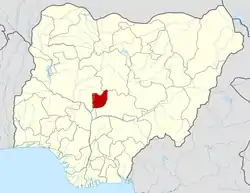Federal Capital Territory, Nigeria
The Federal Capital Territory, commonly known as FCT, or loosely as FCT-Abuja, is a federal territory in central Nigeria. Abuja, the capital city of Nigeria, is located in this territory. FCT was formed in 1976 from parts of the states of old Kwara, Niger, Kaduna and Plateau States with the bulk of landmass carved out of Niger State. It is within the Middle Belt region of the country. Unlike the States of Nigeria, which are headed by elected Governors, it is administered by the Federal Capital Territory Administration, headed by a minister appointed by the President.
Federal Capital Territory | |
|---|---|
.png.webp) Flag | |
| Nickname(s): Centre of Unity | |
 Location of Federal Capital Territory in Nigeria | |
| Coordinates: 8°50′N 7°10′E | |
| Country | |
| Date created | 3 February 1976 |
| Capital | Abuja |
| Government | |
| • Ministry | Federal Capital Territory Administration (FCTA) |
| • Minister[1] | Mohammed Musa Bello |
| • Permanent Secretary | Ajakaiye Babatope |
| Area | |
| • Total | 7,315 km2 (2,824 sq mi) |
| Population (2006 Census)1 | |
| • Total | 1,406,239 |
| • Estimate (2011 estimate) | 2,238,800[2] |
| • Density | 190/km2 (500/sq mi) |
| GDP | |
| Time zone | UTC+01 (WAT) |
| ISO 3166 code | NG-FC |
| HDI (2018) | 0.640[3] medium · 8th of 37 |
| Website | fct.gov.ng |
| ^1 Preliminary results | |
History
The Federal Capital Territory also known as FCT was created upon the promulgation of decree number 6 of 1976. It came into existence due to a need to find a replacement for the capital city of Lagos which had become congested and had little space for expansion. The area chosen as the new capital was principally Gwariland with high concentrations of Muslims and Christians and high degree of neutrality from the dominant ethnic groups.[4]
Decree 6 of 1976, gave the federal government rights over land within the territory. The population density prior to the takeover by the government was sparse with a population of 120,000 residents living in 840 villages and mostly of Gwari heritage.[4] Inhabitants were relocated to nearby towns like Suleja in Niger state and New Karshi in Nasarawa State on the outskirts of the territory.
Geography
The territory is located just north of the confluence of the Niger River and Benue River. It is bordered by the states of Niger to the West and North, Kaduna to the northeast, Nasarawa to the east and south and Kogi to the southwest.
Lying between latitude 8.25 and 9.20 north of the equator and longitude 6.45 and 7.39 east of Greenwich Meridian, Abuja is geographically located in the center of the country.
The Federal Capital Territory has a landmass of approximately 7,315 km2, and it is situated within the Savannah region with moderate climatic conditions.
Natural resources in FCT
Minerals found in the FCT include marble, tin, clay, mica, and tantalite.[5]
Wildlife
The hills of the FCT provide home to many bushbuck, forest Black duiker, bush pig, chimpanzee and red-flanked duiker. Also found in FCT woodland are leopard, buffalo, roan antelope, Western hartebeest, elephant, warthog, grey duiker, dog-faced baboon, patas monkey and green monkey.[6]
Divisions
While the Federal Capital Territory Administration administers the whole of the Federal Capital Territory, the Federal Capital Development Authority (FCDA) specifically manages the construction and infrastructure development of the region. The capital city Abuja is located inside the wider Abuja Municipal Area Council.[7]
The territory is currently made up of six area councils, namely:[8]
Languages
Languages of the Federal Capital Territory listed by LGA:[9]
| LGA | Languages |
|---|---|
| Abaji | Dibo; Gupa-Abawa, Egbira, Ganagana |
| Abuja Municipal Area Council | Gade; Gbagyi, Nupe |
| Bwari | Gwandara; Ashe; Gbagyi |
| Gwagwalada | Gbari, Egibra |
| Kuje | Gade; Gbagyi |
| Kwali | Gwandara; Gbagyi;Egbira, Kami, Ganagana, Nupe |
Ija-Zuba and Nupe are also spoken in the Federal Capital Territory.[9]
References
- See List of Ministers of the Federal Capital Territory (Nigeria) for a list of prior ministers
- "Federal Capital Territory (Nigeria)". City Population. Retrieved 26 October 2015.
- "Sub-national HDI - Area Database - Global Data Lab". hdi.globaldatalab.org. Retrieved 2018-09-13.
- Elleh, Nnamdi. "Chapter 3". Architecture and politics in Nigeria : the study of a late twentieth-century enlightenment-inspired modernism at Abuja, 1900-2016. Milton Park, Abingdon, Oxon. ISBN 9781472465306. OCLC 965828210.
- "FCT State". rmrdc.gov.ng. Raw Materials Research and Development Council. Archived from the original on 22 May 2018. Retrieved 20 May 2018.
- "Federal Capital Territory Administration - Facts". Federal Capital Territory Administration. Archived from the original on 23 December 2008. Retrieved 24 July 2018.
- "Abuja | City Profile, Culture, History & Districts – Villa Afrika". Villa Afrika Realty. Retrieved 2019-02-03.
- Odunsi, Wale (13 January 2018). "Gwagwalada re-run poll: APC beats APGA, PDP in narrow victory". Daily Post Nigeria.
- "Nigeria". Ethnologue (22 ed.). Retrieved 2020-01-10.